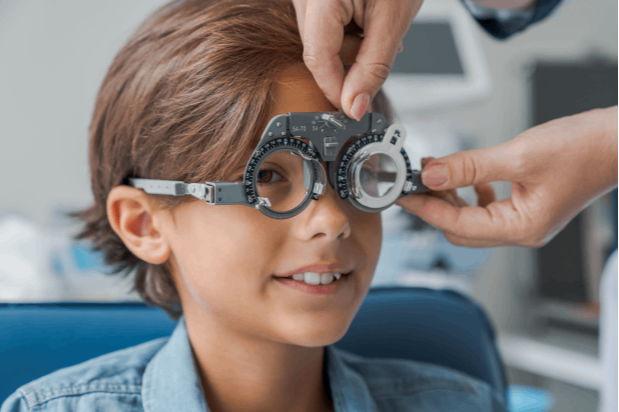All Categories
Featured
Table of Contents
In recent times, technology has made substantial improvements in the area of vision modification, supplying people with even more effective, comfortable, and customized options than ever. From innovative medical treatments to innovative glasses, modern technology is improving exactly how we approach vision adjustment. Right here's an expedition of how these improvements are improving the options available for those in need of vision adjustment.
Recent modern technologies, such as wavefront-guided LASIK, enable more tailored treatment by mapping the unique imperfections in a person's eye. This customized approach can bring about much better visual results and fewer adverse effects, making laser vision improvement a prominent choice for those looking for to reduce or remove their dependence on glasses or call lenses.
New multifocal and suiting IOLs enable a much more smooth transition between near and far-off vision. These sophisticated lenses are developed to lower the reliance on reading glasses after cataract surgery, improving the general lifestyle for clients. Technologies such as toric IOLs also help deal with astigmatism, better enhancing aesthetic clearness.
![]()
Furthermore, flexible lenses that adjust their color based on light exposure can supply convenience and security from UV rays, making certain optimum aesthetic quality in varying conditions. Technologies like these not only deal boosted vision yet also enhance the overall experience for customers.
Additionally, there are customized call lenses designed for particular vision concerns, such as ortho-k lenses that delicately reshape the cornea overnight to lower nearsightedness throughout the day. These innovations make it simpler for people to discover effective and comfortable solutions tailored to their way of living and vision requirements.
Telemedicine enables people to receive follow-up treatment and modifications to their vision modification intends efficiently. This increased ease of access ensures that individuals can receive prompt treatment and make educated decisions regarding their vision wellness.
AI can likewise play a function in individualizing therapy strategies for vision improvement, making sure that individuals obtain the most effective and customized remedies for their certain needs.
1. Laser Vision Correction.
Among one of the most notable innovations in vision adjustment is the advancement of laser vision adjustment procedures, such as LASIK (Laser-Assisted In Situ Keratomileusis) and SMILE (Tiny Incision Lenticule Extraction) These minimally invasive surgeries make use of accuracy lasers to reshape the cornea, enabling light to concentrate properly on the retina.Recent modern technologies, such as wavefront-guided LASIK, enable more tailored treatment by mapping the unique imperfections in a person's eye. This customized approach can bring about much better visual results and fewer adverse effects, making laser vision improvement a prominent choice for those looking for to reduce or remove their dependence on glasses or call lenses.
2. Innovations in Intraocular Lenses (IOLs)
For individuals that are not appropriate candidates for laser surgical treatment, advancements in intraocular lenses (IOLs) have transformed cataract surgery and vision improvement for those with presbyopia (age-related trouble in seeing close things)New multifocal and suiting IOLs enable a much more smooth transition between near and far-off vision. These sophisticated lenses are developed to lower the reliance on reading glasses after cataract surgery, improving the general lifestyle for clients. Technologies such as toric IOLs also help deal with astigmatism, better enhancing aesthetic clearness.
3. Smart Glasses and Wearable Modern Technology.
The assimilation of technology right into eyewear has caused the introduction of wise glasses and wearable gadgets that boost vision modification. As an example, clever glasses geared up with enhanced fact (AR) can overlay digital details onto the real world, aiding individuals with low vision or aesthetic impairments.
Furthermore, flexible lenses that adjust their color based on light exposure can supply convenience and security from UV rays, making certain optimum aesthetic quality in varying conditions. Technologies like these not only deal boosted vision yet also enhance the overall experience for customers.
4. Get In Touch With Lens Innovations.
Get in touch with lens innovation has actually likewise progressed significantly, giving people with a range of choices to satisfy their requirements. Recent advancements consist of day-to-day non reusable lenses, which provide benefit and hygiene, and prolonged wear lenses that can be used continually for numerous days.Additionally, there are customized call lenses designed for particular vision concerns, such as ortho-k lenses that delicately reshape the cornea overnight to lower nearsightedness throughout the day. These innovations make it simpler for people to discover effective and comfortable solutions tailored to their way of living and vision requirements.
5. Telemedicine and Remote Eye Care.
Technology is not just boosting the tools utilized for vision correction but also boosting access to eye treatment solutions via telemedicine. People can now have online examinations with eye treatment specialists, making it extra convenient to go over vision issues and discover modification choices without needing to visit a center literally.Telemedicine enables people to receive follow-up treatment and modifications to their vision modification intends efficiently. This increased ease of access ensures that individuals can receive prompt treatment and make educated decisions regarding their vision wellness.
6. Expert System (AI) in Eye Treatment.
The combination of expert system (AI) in eye care is transforming exactly how vision improvement is approached. AI algorithms can examine imaging data from retinal scans and other diagnostic devices, assisting eye care specialists detect problems like diabetic retinopathy and macular deterioration earlier and extra accurately.AI can likewise play a function in individualizing therapy strategies for vision improvement, making sure that individuals obtain the most effective and customized remedies for their certain needs.
Verdict.
The developments in technology are substantially enhancing vision adjustment options, offering individuals more effective, comfy, and customized services than ever before. From laser vision adjustment and cutting-edge IOLs to smart eyeglasses and AI-driven diagnostics, these growths are improving how we approach vision health and wellness.Latest Posts
Host Your Perfect Event: Venue Rental Alternatives for each Celebration
Published Mar 21, 25
1 min read
Choosing the Right Place: What to Consider for Weddings, Conferences, and Occasions
Published Mar 05, 25
1 min read
Living Room Furnishings Styles
Published Jan 27, 25
0 min read